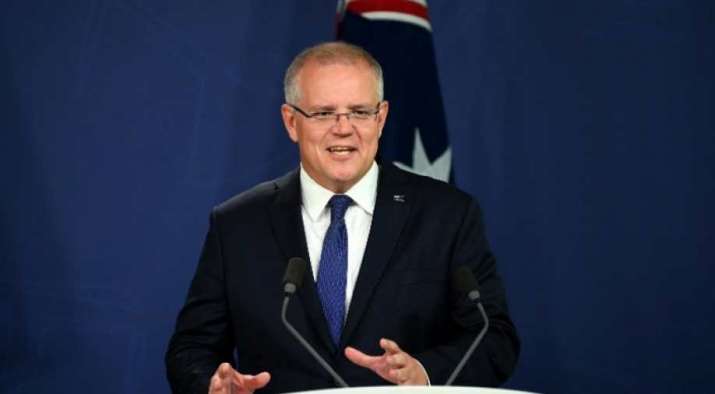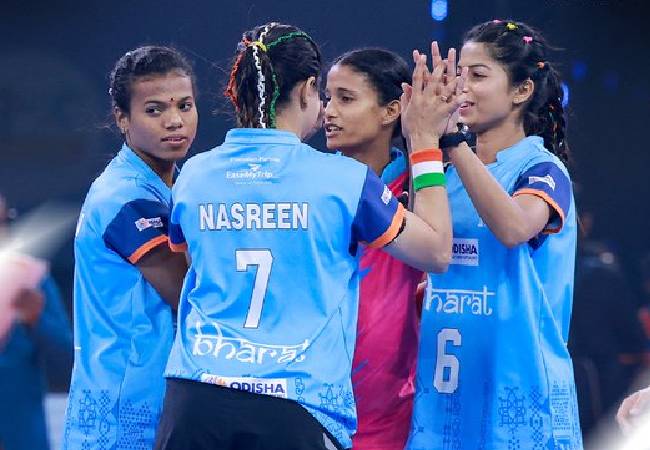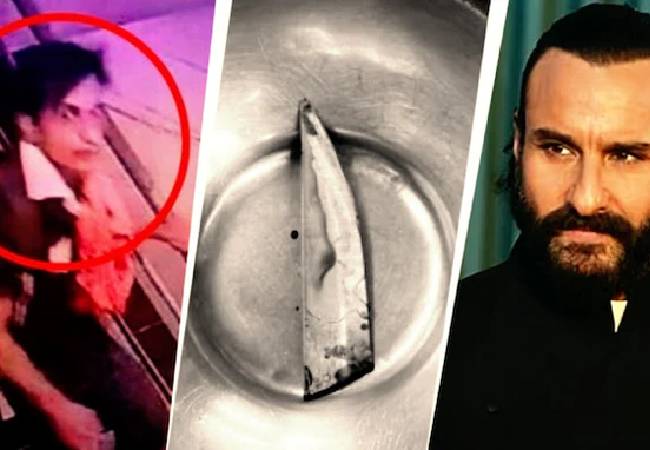Bengaluru, Nov 17: Prime Minister of Australia Scott Morrison on Wednesday said that his country is seeking to establish a new Consulate General in Bengaluru.
He also said that Australia will deepen its ties with India's innovators, technologists and entrepreneurs, as well as the governments at all levels, and asserted that the ties that bind both nations are "indeed strong and abiding".
"I'm pleased to let you know that Australia is also seeking to establish a new Consulate General in Bengaluru. Bengaluru is the world's fastest growing technology hub of course we want to be part of it. It is home to a third of India's unicorn companies," Morrison said.
In his video message to the Bengaluru Tech Summit (BTS)-2021, he said, Australia's new mission in Bengaluru would expand its diplomatic presence in India to five posts.
The video message was played at the 24th edition of the BTS, that was inaugurated by Vice President of India M Venkaiah Naidu, Karnataka Governor Thaawarchand Gehlot, Chief Minister Basavaraj Bommai, Minister for IT & BT, Science & Technology C N Ashwath Narayan, Industries Minister Murugesh Nirani, Biocon chief Kiran Mazumdar-Shaw among others.
Morrison also noted that as the BTS is on, his country is also kicking off the first-ever Sydney Dialogue in Australia, and he was honoured that India's Prime Minister Narendra Modi will address the dialogue tomorrow.
"This is a global summit on emerging, critical and cyber technologies and I'm delighted to be announcing Australia's first-ever Blueprint for Critical Technologies at that event. This signals Australia's firm commitment to shaping the development and adoption of critical technologies internationally, including by working with trusted partners like India," he said.
Noting that technology-leading nations will have greater economic, political and military power and considerable influence on global norms and values into the years ahead, the Australian Prime Minister said India is a major technology power.
"Technology is at the forefront of the Comprehensive Strategic Partnership which Prime Minister Modi and I signed last year. We're already making great progress. We're sharing expertise on cyber and critical technologies like quantum computing and AI. We're working to make our supply chains more secure and resilient," he said.
Indian and Australia are also collaborating on the mining and processing of critical minerals like cobalt and lithium and rare earth elements that are vital to clean energy technologies, and have military applications.
Morrison said both countries are also cooperating on space science, technology, and research, and Australia is proud to be supporting India's inspirational 'Gaganyaan' human spaceflight mission.
"We're deepening our education and research links also vital to technological cooperation, and we're working towards a low-emissions technology partnership, which will see us combine efforts on hydrogen and ultra-low-cost solar," he said.
Highlighting that both countries are also working with the United States and Japan through the Quad Leaders Dialogue, the PM said, "This is about four like-minded democracies coming together, from our region, to show we can make a positive difference in addressing our region's biggest challenges."
It's a very practical and positive partnership fostering an open, accessible, and secure technology ecosystem.
"Together, we're working to bolster supply chain security, advance the deployment of secure 5G and beyond-5G networks, to combat cyber threats, and secure our critical infrastructure, and much more. You know, and I know, that technology isn't developed in a vacuum," he added.
Suggesting that Australia is working with like-minded countries, liberal democracies in particular, to ensure global technology rules and norms reflect liberal democratic values, Morrison said, a new Australia-India Centre of Excellence for Critical and Emerging Technology Policy will contribute to that effort.
"The Centre will bring together Australian and Indian technologists, policy practitioners, academics, researchers and thought leaders. Helping our nations shape technology governance so it aligns with our values and supports an open, inclusive and resilient Indo-Pacific region," he said, adding that it will also promote investment opportunities and innovation between Australia and India in technology, and amplify our policy influence globally.
Further, pointing out that Australia and India are diverse, multicultural, liberal democracies who seek a world that is prosperous, safe and secure, and where human dignity is best expressed through choice and freedom, the Prime Minister said, "We seek to lift up, not suppress. To build a better world, rather than to hold back change."
"Our vision of the world understands the potential of technology to respond to the challenges of our time and to lift all to raise those living standards," he said, "We have witnessed this so powerfully over the past 18 months, with medical breakthroughs now allowing us all to plan for a world after this pandemic."
That same capacity to innovate will be at the fore of all of our efforts addressing climate change and in transitioning to a new energy economy, he added.
Let the Truth be known. If you read VB and like VB, please be a VB Supporter and Help us deliver the Truth to one and all.
New Delhi: The Indian women's team emerged champion in the inaugural Kho Kho World Cup with a dominant 78-40 victory in the summit clash against Nepal here on Sunday.
On a memorable night at the Indira Gandhi Indoor Stadium here, India produced a masterclass of speed, strategy and skill, dishing out a clinical show.
A brisk start marked Turn 1 as the Indian attackers took charge of the proceedings. Three batches in the Nepal women were out by simple touches on 7 occasions, putting 14 points to India's kitty.
Skipper Priyanka Ingle was in the best form with multiple touch points to her name, as the hosts started off in an excellent manner. This was enough to take the Women in Blue to 34 points and preventing a single Dream Run for the Nepal team.
Manmati Dhami got Vaishnavi Pawar, and B Samjhana eliminated Priyanka Ingle but B Chaithra took India's first batch of Turn 2 into the Dream Run.
👸 𝐇𝐢𝐬𝐭𝐨𝐫𝐲 𝐦𝐚𝐝𝐞 🇮🇳🏆
— Kho Kho World Cup India 2025 (@Kkwcindia) January 19, 2025
Congratulations to #TeamIndia women for claiming the 𝐟𝐢𝐫𝐬𝐭-𝐞𝐯𝐞𝐫 𝐊𝐡𝐨 𝐊𝐡𝐨 𝐖𝐨𝐫𝐥𝐝 𝐂𝐮𝐩 👏#KhoKhoWorldCup #KKWC2025 #TheWorldGoesKho #Khommunity #KhoKho #KKWCWomen pic.twitter.com/tqlBPbTIdc
It wasn't for long, though, as Dipa completed the ALL OUT just moments later. This got the side back into the game but they only managed to score 24 points at the end of Turn 2, with an 11-point deficit at half time.
India were once again the dominant force in Turn 3, never allowing the Nepal defenders to settle in their stride. BK Dipa was a regular for Nepal but it went in vain throughout, ensuring that the Indians edged closer to the trophy.
Chaithra was the orchestrator of the Dream Run for India, taking the score to a massive 78 points in Turn 4. Their batch went on for a massive 5 minutes and 14 seconds, closing out the game for India and confirming them as the first-ever champions of the Kho Kho World Cup.
India's path to glory had included commanding victories over South Korea, Iran and Malaysia in the group stages, followed by triumph against Bangladesh in the quarter-finals and a masterful win over South Africa in the semi-finals.
🏆𝐊𝐇𝐎 𝐊𝐇𝐎 𝐂𝐇𝐀𝐌𝐏𝐈𝐎𝐍𝐒🏆||
— All India Radio News (@airnewsalerts) January 19, 2025
Indian🇮🇳 Women's Team beats Nepal 78-40; Clinches the inaugural #KhoKhoWorldCup Trophy. #Finals | #KhoKhoWorldCup | #TheWorldGoesKho | #BharatvsNepal | @Kkwcindia | @Media_SAI | @YASMinistry | pic.twitter.com/mh8NJuD6RX





